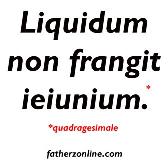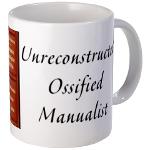If you are serious as a Catholic, you know at all times what is on the calendrical horizon. If you are a follower of the Vetus Ordo of the Roman Church, you have additional help by means of the “gesima” Sundays. This Sunday is Quinquagesima. That means that Quadragesima (Latin for Lent) is upon us.
Reminder.
 According to the 1983 Code of Canon Law for the Latin Church, Latin Church Catholics are bound to observe fasting and abstinence on Ash Wednesday.
According to the 1983 Code of Canon Law for the Latin Church, Latin Church Catholics are bound to observe fasting and abstinence on Ash Wednesday.
Here are some details. I am sure you know them already, but they are good to review.
FASTING: Catholics who are 18 year old and up, until their 59th birthday (when you begin your 60th year), are bound to fast on Ash Wednesday and on Good Friday.
Moral theologians consider what fasting means. Fasting literally means not eating. However, in the manuals we find that fasting is interpreted as 1 full meal and perhaps some food at a couple points during the day, call it 2 “snacks”, according to local custom or law. Two snacks that don’t add up to a full meal. Why is there gap between “not eating” and 1 meal a day. This is because, surely, there are those who because of their profession or the necessities of life, require calories to do their work. Rather than try to parcel out in an paragraph in a manual who merits by work to eat or not eat – which sounds rather creepy – it is reasonable to establish something that pretty much everyone can do as a baseline. You can then ask yourself honestly: Can I do more than that? Or, in the terms of fasting: Can I do less than that?
There is no scientific formula for this. Figure it out.
ABSTINENCE: Catholics who are 14 years old and older are abound to abstain from meat on Ash Wednesday and on all Fridays of Lent.
In general, when you have a medical condition of some kind, or you are pregnant, etc., these requirements can be relaxed.
For Eastern Catholics there are differences concerning dates and practices. Our Eastern friends can fill us Latins in. In general, their “fast” is more serious.
You should by now have a plan for your spiritual life and your physical/material mortifications and penitential practices during Lent.
You would do well to include some works of mercy, both spiritual and corporal.
I also recommend making a good confession close to the beginning of Lent. Let me put that another way:
GO TO CONFESSION!
 “But Father! But Father!”, some of you are saying anxiously, “What about my coffee? I can drink my coffee, can’t I? Can’t I?”
“But Father! But Father!”, some of you are saying anxiously, “What about my coffee? I can drink my coffee, can’t I? Can’t I?”
You can, of course, coffee with and as part of your full meal and two “snacks”. No question there.
How about in between meals on Ash Wednesday?
The old axiom, for the Lenten fast, is “Liquidum non frangit ieiunium … liquid does not break the fast”, provided – NB – you are drinking for the sake of thirst, rather than for eating.

Common sense suggests that chocolate and banana shakes or “smoothies”, etc., are not permissible, even though they are pretty much liquid in form. They are not what you would drink because you are thirsty, as you might more commonly do with water, coffee, tea, wine in some cases, lemonade, even some of these sports drinks such as “Gatorade”, etc.
Again, common sense applies, so figure it out.
 Drinks such as coffee and tea do not break the Lenten fast even if they have a little milk added, or a bit of sugar, or fruit juice, which in the case of tea might be lemon.
Drinks such as coffee and tea do not break the Lenten fast even if they have a little milk added, or a bit of sugar, or fruit juice, which in the case of tea might be lemon.
Coffee would break the Eucharistic fast (one hour before Communion), since – pace fallentes – coffee is no longer water, but it does not break the Lenten fast on Ash Wednesday.
You will be happy to know that chewing tobacco does not break the fast (unless you eat the quid, I guess), nor does using mouthwash (gargarisatio in one manual I checked) or brushing your teeth (pulverisatio because once upon a time we had “tooth powder”).
NB: Concerning the consumption of alligator and crocodile – HERE
I included notes also on the eating of endothermic moonfish, peptonized beef, and muskrat… just in case.
If you want to drink your coffee and tea with true merit I suggest drinking it from one of my coffee mugs. I’d like to offer an indulgence for doing so, but that’s above my pay grade.
I just happen to have available a “Liquidum non frangit ieiunium” mug! HERE

And there’s also this new choice…
3:16 isn’t just in John.


































“Coffee would break the Eucharistic fast (one hour before Communion), since – pace fallentes – coffee is no longer water”
Can. 919 §1 CIC 1983 exempts from Eucharistic fast water and medicine. According to my motto: “There is no life before coffee” coffee is subsumed as medicine by me :-)
Instead of a parish fish fry every Friday in Lent parishes should roast a capybara on a spit and serve it like they do at a pig pickin’!
We have an annual Lenten tradition to argue over the status of artificial ‘bacon bits’. I always vote against them; not due to the ‘meat’ issue, but on the basis that they are an intrinsic abomination and should never be consumed. I look forward to the debate every year…..
A new traditional fasting fellowship was recently formed. More information can be found at https://onepeterfive.com/announcement-new-trad-fasting-sodality
From St. Fidgeta & Other Parodies, John Bellairs —
Q. Does the olive in the martini break the Lenten fast, or is it considered part of the drink?
A.
This problem has vexed some of the subtlest minds of the Church. Is the olive qua olive part of the matrtini qua martini? Or is the olive a substance unto, of, and within itself, per se in the drink rather than per accidens? And the question is further complicated by the fact that, if we consider the composition of liquid matter, an electron is but a tiny olive afloat in the martini of the water glass (so to speak). But here the last word, as usual, goes to St. Thomas, who remarks in his Summa Contra Omnes: “Oliva, quaecumque est, cibus est, et certe ieiunium frangit. “It must be pointed out here that St. Thomas had no mystical foreknowledge of the martini. He was merely listing those solids which are foods (as opposed to those which are not). It must also be said here for the benefit of non-Catholic men who find themselves seated in bars next to Catholic young ladies during Lent, that the offer of an olive should not be construed as an attempt to establish an improper liaison.
What about the cookie that is sometimes served with a malted?
Let us not be silly.
Speaking of coffee, Father, the Carmelites who sell Mystic Coffee are featured on Living Divine Mercy’s episode on Sloth. The episode is on YT. Their property is beautiful.
I seem to recall an additional Lenten penitential practice of some self-imposed variety. I typically abstain from alcoholic beverages for the duration. (Sundays aren’t part of Lent, though, neither are solemnities.)
My Angelus Press missal laid out the traditional fasting/abstinence rules quite well.
I have them down pretty well, except I have a habit of forgetting the ember days.
I just realized now that yesterday was Ash Wednesday. A lot of water under the bridge that I didn’t know that! I wish a productive introspective season to you and your followers.
[Ummmm….]
Ummm?
Ash Wednesday is next week, 22 February, this year.
This Sunday will be Quinquagesima in the traditional calendar. We are still in Pre-Lent.
Dear Kent Wendler,
technically, both Sundays and solemnities are part of Lent. However, technicalities aside, Sundays do indeed not have the Lenten fast (or discipline) but solemnities do.
Under old law, you’d have to fast on them. Present law has reduced the strict obligation of fasting to Ash Wednesday and Good Friday, but does say “the whole of Lent keeps its penitential character”. Hence, while relaxing one’s discipline, the details of which are voluntary in any case, for solemnities is fine and even advisable, treating the days as if Lenten penitence would not apply to them at all would, in my view, not be correct.
Well, if one is beyond the age of required fasting, and if one maintains Friday abstinence year around, should not Lent mean some sort of penitential Lenten discipline beyond Ash Wednesday? I enjoy these beverages, but the annual discipline I find to be beneficial.
Oops. Well, sentiments in advance, then. Pre-Lent, when I was a kid, was “Ordinary Time.”
Pingback: Fr. Z’s Ash Wednesday Kitchen: Sandwich 101 et al. | Fr. Z's Blog